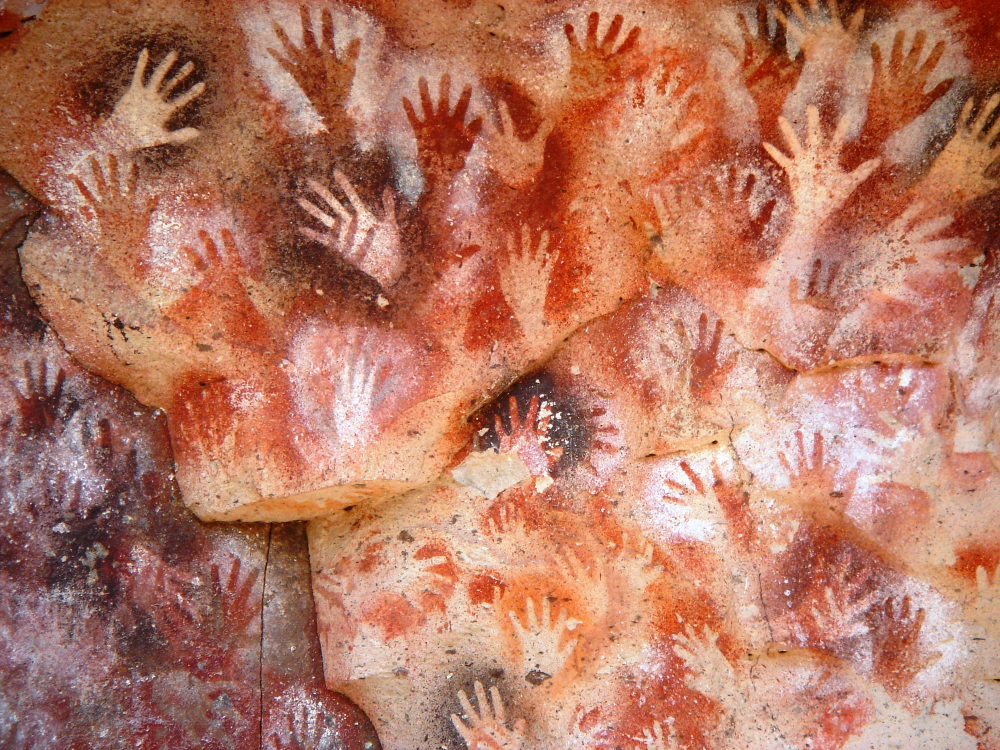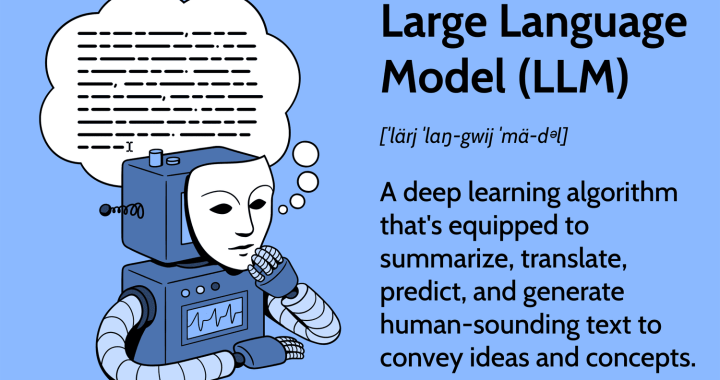(Image taken from “La cueva de las manos,” the Cave of Hands in Santa Cruz, Argentina: a site which would look like an act of vandalism, or the product of a children’s arts and crafts class, unless carbon-dated to 10,000 years ago.)
In response to The New York Times article “650 Prompts for Narrative and Personal Writing.”
351. “How Important Is Arts Education?”
A friend of mine once commented that if the human race ever got so advanced as to have eliminated all suffering then there would be no more art, or at least no need for art. Clearly he sees art as a means of coping with the difficulties of life. One man’s fire, in his view, becomes another man’s fuel. When I related this perspective to another buddy of mine he replied quite the opposite. He said that if we got rid of pain or difficulty then there would only be a flourishing of art. This is more in line with the ideals of a utopian state, I suppose, where what the artist needs above all else is free time, and space to create. An artist who only suffers, only finds blocks to expression.
Is it cheating to agree with both? A painter needs as much the blank canvas of possibility as the oil pastels of experience.
This week I attended a poets.org talk with Elizabeth Alexander and Maria Popova (one a poet, the other an arts commentator). Mrs Alexander stressed the need for poetry at all times, for the highs and lows of life. She will recite the same poem at the rise of a president who represents forward motion, and at the start of one who symbolizes moving backwards. For her the spoken word builds communities, which should prosper and endure, a dual capacity. Ms Popova, echoing Alexander’s idea, went on to say art’s duty is, simply, to help us get through the day. She repeated her concept of art twice more before the end of the talk, and as a result it got recorded in my memory. “Good art just gets us through the day.” What I like about her concept of art is that getting through the day could mean overcoming daily adversity, or celebrating the rituals of life. To live, for both women, can art’s purpose serve.
After art itself, and its duty or purpose, follows arts education. First you make, then you study: critique and creation dance in lock-step.
Both Alexander and Popova, or anyone who spreads the gospel of art, are interested in the dissemination of great ideas. The poet speaks to audiences. The commentator writes for them. For the public to receive these ideas, we note, there must be an educated mind behind each eye and ear. Of course the two women in the talk were teaching as they shared, but during the talk even I was left with questions. I didn’t know everything they were talking about. They quoted many writers and thinkers who’s names I didn’t know, and made elliptical arguments based on the thoughts of old philosophies I had never heard of.
This isn’t to say I didn’t enjoy the talk. In fact, I’m almost always impressed by a discussion in where I don’t catch everything. This leaves me with the urge to research (read, listen) and discover (awaken, know) and share (write, converse). The opposite would be to sit through a low-hanging conversation where arguments and thoughts never reach the top of one’s head. Unless elevated, I’m left mentally crouching. Mystery is a good thing. I hunger for education.
But a solid arts education is fundamental, in the truest sense of the word, not for itself (as with art), but for its utility.
Part of “just getting through the day” involves the capacity for concentration, a high level of empathy for others, and a break from routine. An arts education fosters these three things. If days aren’t boring, they are dangerously monotonous. If days aren’t filled with old trials, they cause new anxieties. In my opinion, merely enjoying art isn’t enough. The enjoyment of art, tempered with an arts education, however, does allow one to appreciate more profoundly, and perhaps even enjoy the work a bit more.
Sitting through lectures, reading essays, or attending museum tours, all aim to develop a capacity for concentration. The discipline it takes to get educated (in arts, in anything) offers one the opportunity to practice focus. Focus is important in our day to day lives, no one denies this. A bad day is marked by the dispersion of energy. A bad day is one where we try to do too much, yet fail to do anything at all. The good days are those where we give ourselves completely to the task at hand. The good days are the ones where we knew what we wanted, and got it. An education in art, and the context it offers us in the enjoyment of art, helps us narrow in on an artist’s intention for a piece, and place the work in a historical context. A light bulb is only a light bulb, until we consider the story of its thousand and one trials and errors — then it becomes the symbol of a new idea. Education lets us see Edison’s invention, or any product of human imagination, as art. To have this education we need discipline, and with discipline comes concentration. And concentration gets us through the day.
One thing is to read a book and enjoy it; another is to understand the craft, see the toil the author endured, and read between the lines, while still enjoying it. Same with any art form — be it listening to an album, watching a movie, or standing before a master painting — enjoying it is natural, but appreciating it fully involves placing yourself in the creator’s mind. An arts education allows us to empathize with the artists whose pieces give us pleasure. Through reading biographies of artists, and studying the style and form of their work, we come to a deeper understanding of their creation, and as a result develop a deeper relationship with another human. As author/professor Sigrid Nunez said in an interview:
I don’t pay that much attention to reader reviews because those reviews tend to treat books as if they’re just another consumer product, like an appliance or a pair of shoes, rather than as an experience, an encounter with another consciousness. Also, there’s the matter of subjectivity. Most online reviewers are the kind of reader who looks into a book wanting to find his or her own opinions and beliefs and a protagonist with whom they strongly identify. If they don’t find these so-called relatable things, they blame the book’s author and don’t think anything of panning the book, very often hyperbolically, and with unseemly relish.
These reviewers would appear to come from no frame of reference outside their own tastes. They seem to be more interested in having their views validated, than understanding another human consciousness. A truer encounter with art would be one where the viewer meets the artist halfway. Here, empathy is called for, and an arts education builds that empathy. It goes without saying that the empathy exercised in the study of art can be applied to daily life. Imagine a world where we understood one another a little bit better. Wouldn’t that be a better world?
Lastly, and in relation to the most important gift of art: the ability to take us out of the mundane, break the rut. Many passengers on New York subways hear the music of performers at stations, but fewer listen. Sometimes the music is good, but not always. To be honest, I intentionally seek out these musicians, precisely because I read a piece once about a virtuoso in DC, who with a 3.5 million dollar violin played a set, which would have cost an attendee one hundred dollars to watch in a concert hall, for a thousand people in a DC train station one day. Only seven of those thousand people stopped to listen or even turn their heads. A shame, you never know who these musicians are, unless you pay attention, unless study them at least in the moment. A silly example, I know, but the truth is having read about one musician has influenced my experience of all other buskers. Also, I would never have been able to appreciate the MoMa or the Louvre as profoundly as I did, had I never taken Art History in high school. Same with two of my favorite films of all time. Pink Floyd’s movie The Wall would never have made sense to me, if I hadn’t read the Wikipedia page explaining it; same with Tarkovsky’s Solaris, where essays were critical in deciphering its meaning. Music theory class helped me appreciate music as a whole, whereas a panel with Sean Combs helped me appreciate his music in particular. Apply this to all arts. It isn’t that I wasn’t getting an intuitive feeling from art without lectures, essays, classes, tours, but without a doubt the study of art helped. “Studying art” became much more than an “arts education,” it became a study into my own thoughts. I could label what I had previously experienced. It goes without saying that my Master in Fine Arts is important to my life in many ways, the reasons of which will go unlisted here at the tail end of this essay.
The point stands: an arts education is important. How important? Very. Not just to understand art itself, which most of the time doesn’t even ask to be understood, but to appreciate with greater care, to understand oneself, to get us through the day, to…
…read someone else’s thoughts on a blog, understand where he’s coming from, and have new thoughts of your own.




